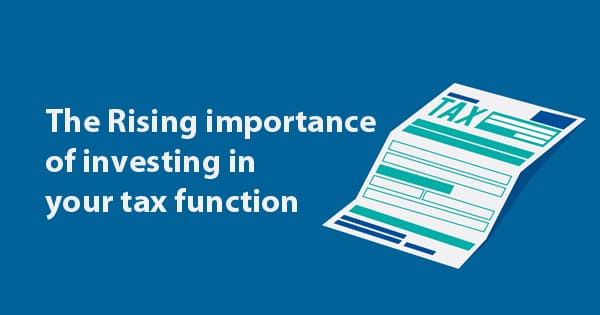
As globalisation accelerates, Tax issues have become all the more complex and relevant to an organisation’s business and commercial strategy. Simultaneously, companies face increased demands by the tax authorities for more information at a faster pace; demands that are set to increase throughout 2020, with the arrival of Tax Transparency issues, the practicalities of SAO sign-off and topical structural reform.
In light of these constant changes, it is vital for tax to be both a technical and commercial business partner. Often this requires a business building out a first-time in-house tax function, or the restructuring of an existing one. Whether a stand-alone tax function or a greenfield site, the question remains-How can the CFO justify this investment?
Justifying further investment in the tax function
International Government legislation now requires all large businesses to publish their tax strategy online and free of charge. Companies need to respond in a clear and thoughtful way to this, bearing in mind that the audience of stakeholders is wider than ever before: not only tax authorities and governments but also regulators, investors, non-governmental organisations, the media and general public. A growing media focus, external perceptions of how a company manages its tax affairs can have real impacts on its well-being and reputation. This stakeholder visibility over tax affairs and strategy looks set to continue, meaning that managing reputational risk must be a top priority for any large business. Risk continues to be a key theme as we continue through 2020 with increased focus around reputation, managing and introducing documentation measures to avoid this exposure.
This has led to a clear fixation of Tax Transparency in the market, and active debate around paying ‘fair tax’, which has raised the bar in terms of expectations of the level of tax information provided by multinational companies. It is expected many organisations will respond with a greater degree of disclosure and accessibility. With the need for more robust risk control frameworks around tax, it is increasingly important for tax to partner with the business. In response, we’ve seen a rise in companies making fundamental shifts in the treatment of their current out- sourced arrangement tax affairs and within existing tax functions, restructuring, reskilling and ultimately altering the DNA to ensure that they are set up to meet these new requirements. In short, companies must look not only for technical expertise, but also for strong commercial acumen &understanding.
The key to constructing a business case for building out or restructuring a tax presence is in diversifying the business perception of tax away from a function that only minimises risk and towards beingnoticed as a place that can add significant value to the business. While the former should most certainly not be overlooked, particularly in light of the increasingly important need to identify, analyse and mitigate tax risk, CFOs without an in-house tax presence have concurrently sought to evaluate whether their current out-sourced arrangement still suits the more complex demands that are placed upon them. Companies are, as a high priority, working on striking a balance between competing concerns to ensure that they remain compliant whilst still adding value. This has led to a marked shift in the way tax is perceived externally.
How does bringing a tax function in-house benefit me?
In the current economic climate, the outsourcing model is notably expensive for many businesses. The professional firms’ fees are significant, causing a marked trend across medium to large sized companies towards bringing various parts of their tax function in-house. Aside from the financial cost, what are the other benefits?
Building an in-house tax capability is a big and positive step for organisations, however, there are, naturally, a few challenges to overcome. With businesses reducing staff headcount, there may be issues around approval of additional resources. In addition, businesses may not want to go through the arbitrary process of recruiting tax professionals because they perceive the talent pool to be relatively scarce.
However, this is not the case; we have seen significant rise in candidates wanting to move in-house and further their career within a dynamic, fast-growth business. This has resulted in the talent pool available across industries diversifying. In addition, with the more complex and varied environment that in-house tax brings to an individuals career- we often find the opportunity to establish or join a developing function one of the most sought after areas of the market.
For those organisations who believe that establishing a new in-house tax function may be an ambitious step from where they currently are, a strong interim tax resource can sometimes bridge the gap without taking on long term risk. With the required tax expertise, this person can often bring real experience and skills to a team that may be under resourced. With an objective perspective, an interim solution can spot areas of weakness and may be able to suggest innovative solutions to contribute to immediate tax savings and cover any potential risks.
Disclaimer: Content posted is for informational & knowledge sharing purposes only, and is not intended to be a substitute for professional advice related to tax, finance or accounting. The view/interpretation of the publisher is based on the available Law, guidelines and information. Each reader should take due professional care before you act after reading the contents of that article/post. No warranty whatsoever is made that any of the articles are accurate and is not intended to provide, and should not be relied on for tax or accounting advice.
You can access Law including Guidelines, Cabinet & FTA Decisions, Public Clarifications, Forms, Business Bulletins for all taxes (Vat, Excise, Customs, Corporate Tax, Transfer Pricing) for all GCC Countries in the Law Section of GCC FinTax.